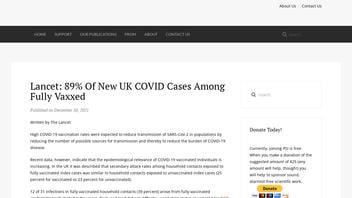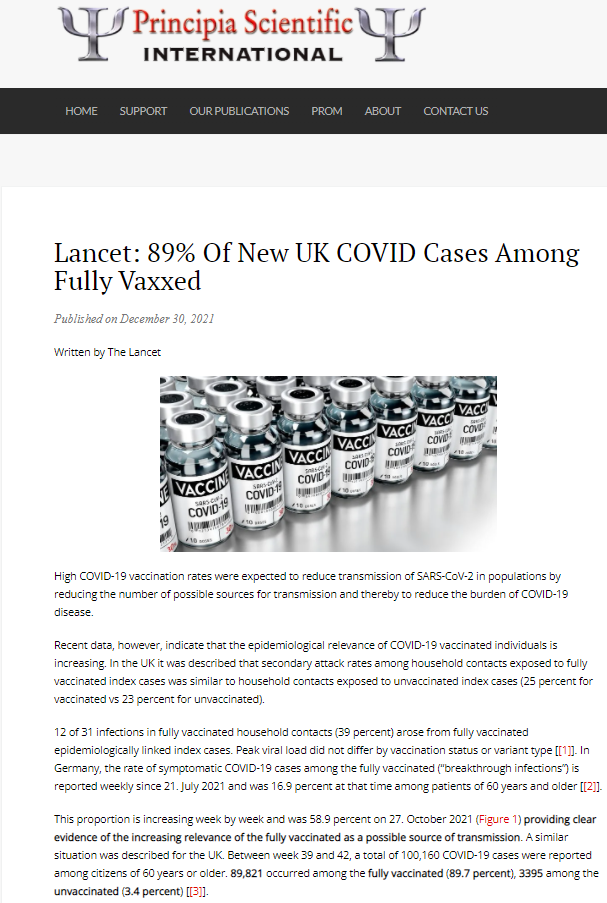
Do fully vaccinated people account for 89% of COVID-19 cases in the United Kingdom? No, that's not true: The actual percentage is less than half that number and the claim misleadingly attributes the figures to The Lancet science journal. According to the COVID-19 vaccine surveillance report - Week 43 by the UK Health Security Agency published on October 28, 2021, 42% of COVID cases in the UK were among the fully vaccinated. The 89% figure is only for fully vaccinated people age 60 and above. The figures were included in a reader's letter to the opinions page of the highly regarded journal, but were not the product of Lancet journalists or invited contributors.
The claim appeared in an article (archived here) published by Principia Scientific International on December 30, 2021, under the title "Lancet: 89% Of New UK COVID Cases Among Fully Vaxxed". It opened:
High COVID-19 vaccination rates were expected to reduce transmission of SARS-CoV-2 in populations by reducing the number of possible sources for transmission and thereby to reduce the burden of COVID-19 disease.
This is what the post looked like on Principia Scientific International website on January 3, 2022:
(Source: principia-scientific.com screenshot taken Mon Jan 03 17:25:52 2022 UTC)
Not written by The Lancet
The article on the Principia Scientific International website was a reprint of a letter that was published in The Lancet on December 1, 2021, under the title "The epidemiological relevance of the COVID-19-vaccinated population is increasing." Principia Scientific International substituted the misleading and inaccurate headline "Lancet: 89% Of New UK COVID Cases Among Fully Vaxxed" for its version. While it was published in The Lancet Regional Health Europe, the letter was written solely by Dr. Günter Kampf, a professor at University Medicine Greifswald, Institute for Hygiene and Environmental Medicine, in Germany, according to the author contribution statement. The Lancet, a British medical journal, had nothing to do with its content.
Only 60+
The COVID-19 vaccine surveillance report - Week 43 cited in the article does not say 89% of new COVID cases in the United Kingdom at the time were among the fully vaccinated, as the headline suggests. While the figure is true for ages 60 and above, it's much lower for the entire population. For the period covered in the report (December 8, 2020, to October 24, 2021), fully vaccinated people (Page 15, Table 2) made up 42% of all UK COVID cases. The unvaccinated were 45.7%. The partially vaccinated accounted for the remainder.
The paradox of a high vaccination rate
The UK population was 82.5% fully vaccinated and 59.5% boosted as of January 3, 2022, with more than 133 million doses given, according to the UK's coronavirus website. That compares to 61.2% for the United States through December 17, 2021, according to the Centers for Disease Control and Prevention (CDC). As of November 1, 2021, everyone 16 years of age and older was eligible to get a COVID-19 vaccination in the UK.
The UK COVID-19 vaccine surveillance report for Week 51 includes this note in its "Interpretation of data" section (page 34). As the percentage of COVID cases among fully vaccinated people has increased along with the overall vaccination rate, it's left a shrinking pool of unvaccinated persons:
In the context of very high vaccine coverage in the population, even with a highly effective vaccine, it is expected that a large proportion of cases, hospitalisations and deaths would occur in vaccinated individuals, simply because a larger proportion of the population are vaccinated than unvaccinated and no vaccine is 100% effective. This is especially true because vaccination has been prioritised in individuals who are more susceptible or more at risk of severe disease. Individuals in risk groups may also be more at risk of hospitalisation or death due to non-COVID-19 causes, and thus may be hospitalised or die with COVID-19 rather than from COVID-19.













